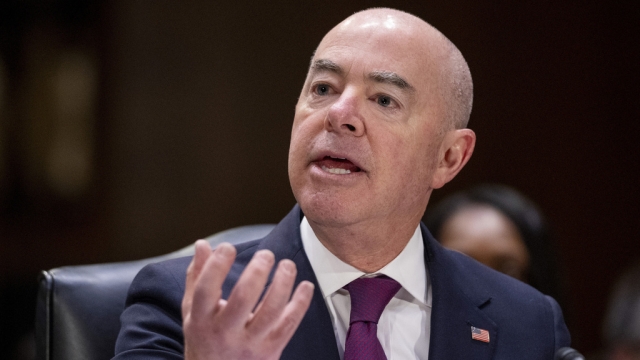The Senate has options for dealing with Alejandro Mayorkas' impeachment.
On their second attempt, Republicans in the House of Representatives voted to impeach Homeland Security Secretary Mayorkas Tuesday night by a vote of 214-213.
This is the first timesince 1876 that such an impeachment vote has taken place. Now the Senate is responsible for holding a trial to determine if Mayorkas should be removed from office.
All signs point to the Senate quickly dealing with this issue and allowing Mayorkas to remain the head of DHS.
Following the House vote to impeach Mayorkas, Scripps News learned that the Senate's impeachment trial will begin Feb. 26.
“The House impeachment managers will present the articles of impeachment to the Senate following the state work period. Senators will be sworn in as jurors in the trial the next day. Senate President Pro Tempore Patty Murray will preside," said the office of Senate Majority Leader Chuck Schumer.
With Democrats in the majority, the Senate is unlikely to hold a lengthy impeachment trial that would bring most other business on the floor to a halt. The Senate has three main options for avoiding a full trial, and all of them would only require a simple majority vote:
First, a senator could offer a motion to dismiss the articles of impeachment, and that would dismiss the articles entirely, bringing the process to an end.
Another option is that a senator could raise a point of order that could claim the articles are unconstitutional or violate the Senate rules in some way.
Third, the Senate could vote to send the articles of impeachment to a committee. That committee could proceed with a trial, keeping evidence and witnesses away from the spotlight of the Senate floor, or the committee could delay action and leave the issue pending without a clear resolution.
"All of those would obviate the need for a full-on trial, which I think the chances of that happening are next to zero," said Paul Schiff Berman, the Walter S. Cox professor of law at the George Washington University School of Law. He said the Senate is not required to hold a trial, and he supports the Senate quickly dismissing the Mayorkas impeachment. "I think it's important to recognize how deficient the House impeachment articles are. They haven't even come close to alleging any kind of crime or misdemeanor that Mayorkas has committed. They haven't brought forth any evidence. The articles themselves are a mess from a legal point of view," Berman said.
SEE MORE: House votes to impeach Homeland Security Secretary Alejandro Mayorkas
Trending stories at Scrippsnews.com



